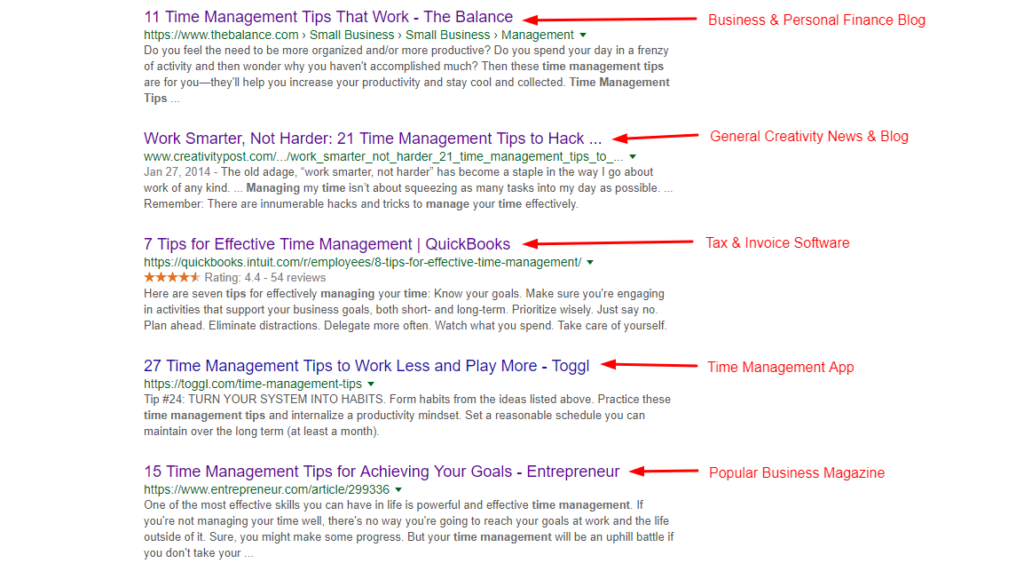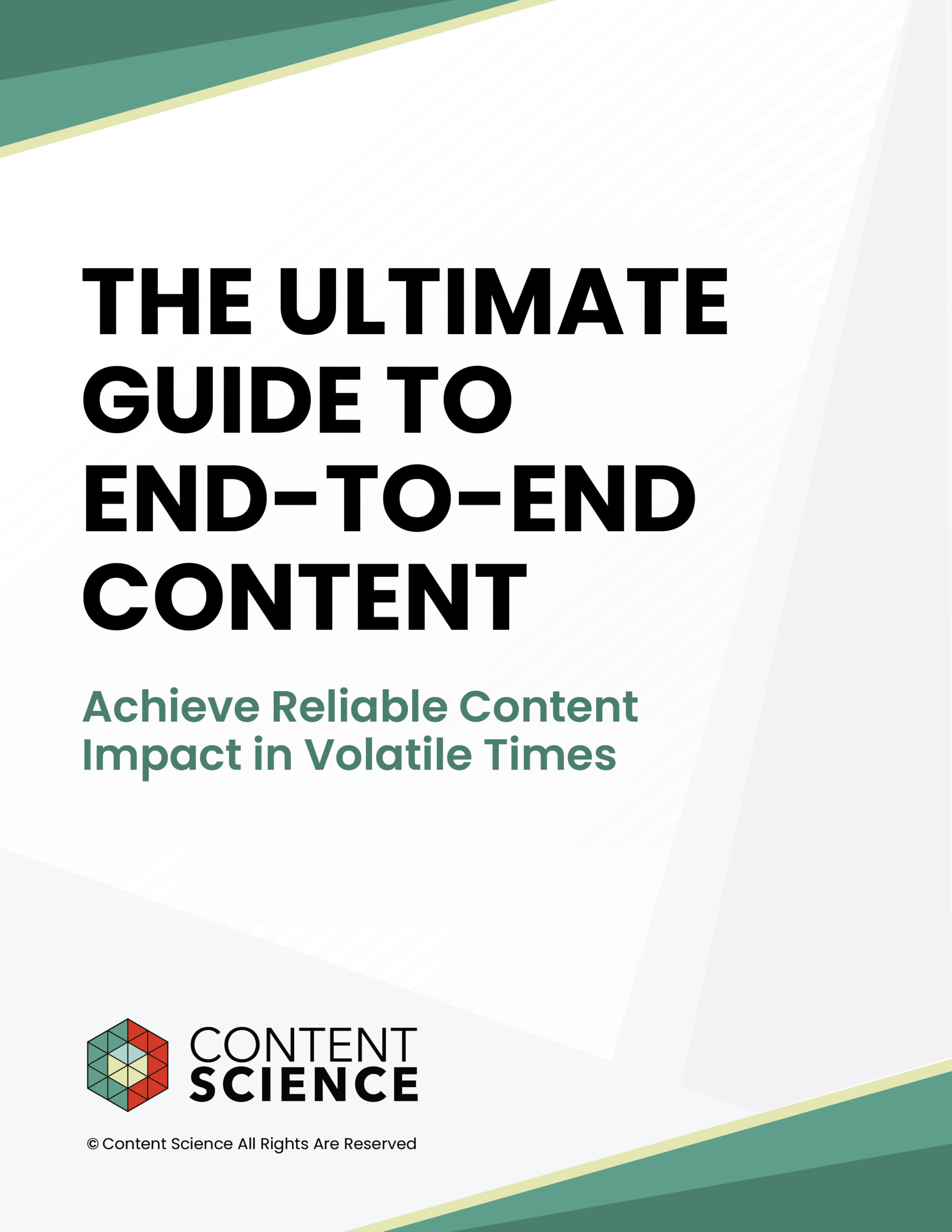
When analyzing your competition, do you consider your content competitors? Do you know who your content competitors are? Or better yet, what content competitors are?
When it comes to creating content, especially with the goal of ranking in Google and attracting search traffic, it helps to know who your content competitors are and what type of content they create.
Putting it simply, a content competitor is any person or company that produces the same type of content as you. They might be targeting a similar audience or writing on a similar topic. But keep in mind that they won’t necessarily be a direct competitor, especially if they sell a different product than yours (or don’t sell anything at all.)
But they could still be a content competitor.
While a direct competitor poses a problem because they sell a similar product or service as you, a content competitor poses a problem because they can “steal” attention away from your content.
Consider this excerpt from The Content Advantage (Clout 2.0) by CSR Founder and CEO Colleen Jones.
“As you consider your unique opportunity to win, remember that in content your competitors are not only your business competitors. Your competitors are other potential sources of pertinent content.”
Also, keep in mind that content competition happens at many different points in the user experience, not just in search. However, in this article, we’ll be focusing on competing for attention via search.
Many companies create content to target a specific keyword or phrase that people search for in Google. To attract visitors, you want to be on the first page for these search results (ideally, the top result).
Of course, there will be other companies trying to rank for the same term. However, these companies won’t necessarily sell the same product or service as you. Their target audience is similar, though, so their audience enjoys the same type of content that you produce.
For example, let’s say Company A sells fitness equipment like dumbbells or weight machines, and Company B sells supplements like powdered protein, vitamins, etc.
Although these companies sell different products, both are in the fitness industry. Thus, their target audience will likely be interested in the same type of content (ex. articles on workout programs, how to get in shape, etc.). While these companies are not direct competitors, they are content competitors.
Two companies don’t need to be in the same industry, though, in order to be content competitors.
Let’s look at another example. If we search the term, “Time Management Tips”, within the first five results, we see five very different websites:

The first result is an article by The Balance, a website that creates content focused on business and personal finance topics. The second is Creativity Post, a website that creates articles on topics such as tech, philosophy, science, and education. The third result is an article by Quickbooks, the popular tax and accounting software. The fourth result is Toggl, a time management app. The fifth result is the ultra-popular business magazine, Entrepreneur.
Only one of these five results sells a product that directly relates to “Time Management.” That company is Toggl, which sells a time management app that starts at $9/month.
Three of the results don’t even sell a product or service. Those three being The Balance, Creativity Post, and Entrepreneur. Instead, these companies make money via advertising.
None of these companies are direct competitors of a company selling a time management product or service. However, they are all competing in the same content space.
Toggl wants to rank for the term “Time Management Tips” because they sell a product directly related to time management. Thus, ranking for this term will bring in new leads. However, the other companies create content in this space because they have a similar audience that cares about time management.
Entrepreneur’s audience consists of people who are busy running a company, managing a team, and working long hours. So their audience would appreciate an article on how to optimize their time. The same goes for a site like Quickbooks, whose software caters to small business owners.
For a site like Toggl, in this case, they not only need to compete with their direct competitors, they need to compete with companies like Entrepreneur and Quickbooks when it comes to creating content for search.
Why Is Knowing Who Your Content Competitors Are Useful?
So why would want to know who your content competitors are? There are few good reasons. For one, you’ll have a better understanding of how difficult it will be to rank for a particular keyword in Google. While you may be able to outrank some of your direct competitors, outranking some of your content competitors will be a challenge if you’re going up against sites like Entrepreneur, Forbes, etc.
Two, knowing who your content competitors are can help you generate content ideas for your own audience. For example, you can browse through their sites and come up with your own article ideas based on some of the content they’ve already published.
Taking that idea a step further, you can analyze a specific article on their website using a tool like Ahrefs to see how that content has performed (as indicated by social shares and links to the URL):

You can also take a look at what keywords that page ranks for:

This is helpful in identifying possible keywords to target with your own content.
In the Organic Keywords area, you can also see the Keyword Difficulty for all of the keywords that page ranks for. Keyword Difficulty is a metric used by Ahrefs that identifies how tough it will be to rank for any given keyword. The lower this number is, the easier it will be to rank high in Google for that keyword. Moz also has a similar metric.
Using this method, you can find content ideas that your audience will enjoy and identify the best keywords to target using that content.
It Pays to Know Your Content Competitors
By knowing who your content competitors are, you’ll be better prepared to create effective content that your audience will enjoy. Overall, you’ll have a better idea of what type of content to create, what has already performed well, and what keywords to target.
You’ll also be able to better compete with your content competitors, hopefully outranking them via Google rankings, and converting those search results into valuable actions for your business.
Events, Resources, + More
The Ultimate Guide to End-to-End Content
Discover why + how an end-to-end approach is critical in the age of AI with this comprehensive white paper.
The Content Advantage Book
The much-anticipated third edition of the highly rated book by Colleen Jones is available at book retailers worldwide. Learn more!
20 Signs of a Content Problem in a High-Stakes Initiative
Use this white paper to diagnose the problem so you can achieve the right solution faster.
Upskill with Content Science Academy
Training for modern content roles through on-demand certifications + courses or live workshops.






Comments
We invite you to share your perspective in a constructive way. To comment, please sign in or register. Our moderating team will review all comments and may edit them for clarity. Our team also may delete comments that are off-topic or disrespectful. All postings become the property of
Content Science Review.